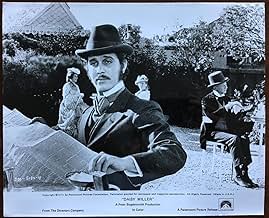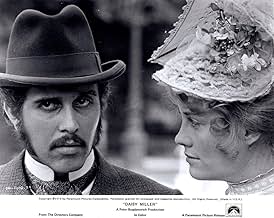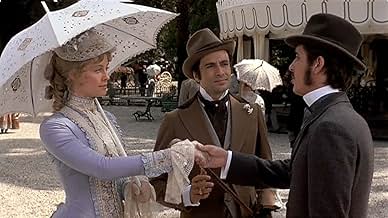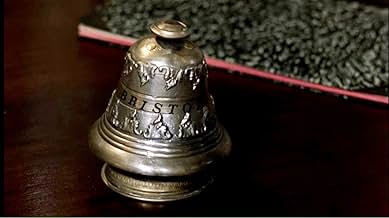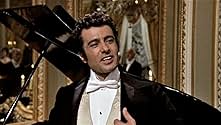AVALIAÇÃO DA IMDb
6,2/10
2,2 mil
SUA AVALIAÇÃO
Nesta comédia de costumes, Frederick Winterbourne tenta descobrir a brilhante Daisy Miller, apenas para ser ajudado e impedido por falsos julgamentos de seus amigos.Nesta comédia de costumes, Frederick Winterbourne tenta descobrir a brilhante Daisy Miller, apenas para ser ajudado e impedido por falsos julgamentos de seus amigos.Nesta comédia de costumes, Frederick Winterbourne tenta descobrir a brilhante Daisy Miller, apenas para ser ajudado e impedido por falsos julgamentos de seus amigos.
- Direção
- Roteiristas
- Artistas
- Indicado a 1 Oscar
- 1 vitória e 1 indicação no total
- Direção
- Roteiristas
- Elenco e equipe completos
- Produção, bilheteria e muito mais no IMDbPro
Avaliações em destaque
Don't let the first 10 minutes fool you, this movie is tremendous. Shepherd might seem off putting at the start, but she fully takes hold of the character and Brown's sad eyes do more to sell the story than anything. Sure it's set in a bygone age, but the feelings are totally universal and the ending is just devastating. This is totally unfairly passed over and deserves more attention. It's every bit as good as Barry Lyndon, just in a different way.
Based on Henry's James novella, Peter Bogdanovich brings us a period dramedy about American high society in Europe of the 19th century. Daisy (Cybill Shepherd) is a strong willed young heiress, a woman out of her time who isn't afraid to tease and flaunt authority figures as well as men, much to the chagrin of 'polite' society. Fresh faced yuppie Frederick Winterbourne (Barry Brown) tries to wrap his head around this unusual young woman as they tour around the beauty of Italy and France.
While it may be dramatically lacking, there's something breezy, cheeky and appealing about Bogdanovich's once maligned film, much like its title character. Off the bat, the production values are stellar: it's sumptuously photographed with excellent period detail as we go around the sun drenched country and old cities of South Europe. Also, Bogdanovich doesn't shy from long takes, allowing actors to build up a lot of chemistry and back and forth between them as they banter about society and the landscape, which of course, masks their real intent. James' writing, adapted by Frederic Raphael, is laced with subtext while being rather amusing, especially by the usually stuffy nature of period pieces.
Now, one thing made fun of back during the original release was Shepherd's performance, seen as too ditsy and airy, but I disagree. Shepherd's skills as a comic actress allow her to be somewhere between cunning and insolent, as befitting such a character, and she works well with the far more straight, traditionalist Brown as Winterbourne. Supporting them capably are the likes of Cloris Leachman as Daisy's dotty mother, Mildred Natwick as Daisy's stern aunt and especially Eileen Brennan as the prim, snobby socialite Mrs Walker who serves an ideological counterpoint to Daisy and does it superbly.
What ultimately does hold back 'Daisy Miller' is, ironically, the material itself: it isn't terribly cinematic, beautiful as the landscape is. James' story is very heavy on dialogue and situation as opposed to action, making it feel more like a stage play in style than a screenplay. 90% of the film is characters just waxing philosophical and discussing gossip and combined with the comic slant, does take down any real dramatic stakes as there's not much to lose for our lead other than 'respect'. Bogdanovich seems to have embraced the cheek of Daisy moreso than any sort of deeper satire of social structures and the pomp of Americans which the story clearly leans towards. That being said, it was still rather enjoyable. Long before the Merchant Ivory years made frills and carriages a must for cinema, a sense of humour and the strong cast make this pleasant, if not particularly demanding, viewing.
While it may be dramatically lacking, there's something breezy, cheeky and appealing about Bogdanovich's once maligned film, much like its title character. Off the bat, the production values are stellar: it's sumptuously photographed with excellent period detail as we go around the sun drenched country and old cities of South Europe. Also, Bogdanovich doesn't shy from long takes, allowing actors to build up a lot of chemistry and back and forth between them as they banter about society and the landscape, which of course, masks their real intent. James' writing, adapted by Frederic Raphael, is laced with subtext while being rather amusing, especially by the usually stuffy nature of period pieces.
Now, one thing made fun of back during the original release was Shepherd's performance, seen as too ditsy and airy, but I disagree. Shepherd's skills as a comic actress allow her to be somewhere between cunning and insolent, as befitting such a character, and she works well with the far more straight, traditionalist Brown as Winterbourne. Supporting them capably are the likes of Cloris Leachman as Daisy's dotty mother, Mildred Natwick as Daisy's stern aunt and especially Eileen Brennan as the prim, snobby socialite Mrs Walker who serves an ideological counterpoint to Daisy and does it superbly.
What ultimately does hold back 'Daisy Miller' is, ironically, the material itself: it isn't terribly cinematic, beautiful as the landscape is. James' story is very heavy on dialogue and situation as opposed to action, making it feel more like a stage play in style than a screenplay. 90% of the film is characters just waxing philosophical and discussing gossip and combined with the comic slant, does take down any real dramatic stakes as there's not much to lose for our lead other than 'respect'. Bogdanovich seems to have embraced the cheek of Daisy moreso than any sort of deeper satire of social structures and the pomp of Americans which the story clearly leans towards. That being said, it was still rather enjoyable. Long before the Merchant Ivory years made frills and carriages a must for cinema, a sense of humour and the strong cast make this pleasant, if not particularly demanding, viewing.
For his first film un color Peter Bodanovich chose a most curious and arcane subject, 19th century novel by Henry James. Daisy Miller on screen is an Americaniized version of onr of those films that the Merchant-Ivory team do
so well with for British subjects.
Our title role is played by Cybill Shepherd and Daisy is a rather ingenuous girl traveling with her mother Cloris Leachman and much younger brother James McMurtry. They're over from, Schenectady where the father made big money and employed a lot of the town.
The Millers are the subject of much gossip by other expatriate Americans like Mildred Natwick and Eileen Brennan. Mainly because they don't know the ropes and Daisy scandalizes them by going out unescorted and with European men who are after American virtue and money.
Barry Brown is Natwick's nephew and an expatriate student. He's the only one who finds Shepherd intriguing, but won't break convention.
Shot on location in Switzerland and Rome the film really captures the look and feel of 19th century Europe. Daisy Miller got an Oscar nomination for costume design. It's beaitifully crafted and sad that the film did not do so well at the box office.
I guess Henry James was out of season.
Our title role is played by Cybill Shepherd and Daisy is a rather ingenuous girl traveling with her mother Cloris Leachman and much younger brother James McMurtry. They're over from, Schenectady where the father made big money and employed a lot of the town.
The Millers are the subject of much gossip by other expatriate Americans like Mildred Natwick and Eileen Brennan. Mainly because they don't know the ropes and Daisy scandalizes them by going out unescorted and with European men who are after American virtue and money.
Barry Brown is Natwick's nephew and an expatriate student. He's the only one who finds Shepherd intriguing, but won't break convention.
Shot on location in Switzerland and Rome the film really captures the look and feel of 19th century Europe. Daisy Miller got an Oscar nomination for costume design. It's beaitifully crafted and sad that the film did not do so well at the box office.
I guess Henry James was out of season.
It almost feels mean to criticise Cybill Shepherd for being so unsuitable for this role, as she is so miscast. She plays the Daisy of the title, and is dull. When we first meet her, she's a pretty, spoilt, self-obsessed tease, and that's it. 90 minutes later that's still it. Barry Brown (Frederick) is, unfortunately, equally dull and one-note. Frederick chases Daisy, she teases him, and repeat until the end credits. That's a tough watch - especially when you've seen Ms Shepherd do it before, more concisely. Mr Brown has few expressions which give a hint of anything inside him that we may care to know more about. This film needed stars, or, at least, compelling character actors. The boredom is relieved by occasional flashes of melodrama in Eileen Brennan's eyes (but even they become repetitive), and some lovely photography, but the whole is empty of story, character, history, social milieu; even the dialogue goes on too much and is either commonplace or flatly rendered. There are moments of interesting observation, but there are scant. I shall read the Henry James story on which the film is based and try to work out what it was that the makers of this vacant film were striving for.
Many reviewers here seem to have confused the story and characters with the film and the actors.
Yes, Daisy in the film is rather flat and monotonous. But that's a high compliment -- that the ravishing Cybill Shepherd could so accurately portray such a flat character. Henry James at one point describes Daisy's expression as a "light, slightly monotonous smile", in another her voice as a "little soft, flat monotone". He says late in the story that "there was always, in her conversation, the same odd mixture of audacity and puerility". No, she wouldn't be a very pleasant person to be around for long. But that was part of James's point: that our attraction to people (especially those of the opposite sex) often defies reason. Shepard makes the point well.
Some have commented that they wished the story had been filled out. Some of those apparently haven't read the story. One of those critics even places the story wrong by forty years. Though called a novella, it's barely more than a short story. In fact the film does a remarkable job of portraying the events and (more importantly) the characters very much as they are in the story. The great majority of the dialog in the film is verbatim from the story.
In some instances, the scenes and characters were significantly expanded from the James story. How far should a director go, if the aim is to film a classic story, not just to make something derived from that story? James's characters were pretty flat, a lot flatter than those in the film. One could justifiably criticize the film for telling the story far better than James did.
Do you think James's story is dated and flat in the modern world? Well, in many ways so do I. A polemical assault on discrimination based on manners and birth is truly dated. Yet an assault on personal discrimination remains fully current. The modern world is certainly not devoid of personal discrimination. Perhaps it's not often so ugly, not in the first world anyway, but prejudice is very much alive.
James's story is also unsubtle: two groups of people with differing views, one person caught with one foot in each camp, unhappy results. That's about it. Should one film the classic story, or build something different? It's a choice; great films have been made both ways. The choice for this film was unambiguous: to film the classic story.
The photography is truly gorgeous -- the film (at least the outdoor parts) was shot on location in Vevey, Switzerland and Rome, Italy. Despite the long stretches of dialog, including Daisy's run-on commentaries, one need not strain to understand the words. If the story were as good as the production and acting (several good performances) then this would be a 10. The faithfulness to the original weights it down.
Yes, Daisy in the film is rather flat and monotonous. But that's a high compliment -- that the ravishing Cybill Shepherd could so accurately portray such a flat character. Henry James at one point describes Daisy's expression as a "light, slightly monotonous smile", in another her voice as a "little soft, flat monotone". He says late in the story that "there was always, in her conversation, the same odd mixture of audacity and puerility". No, she wouldn't be a very pleasant person to be around for long. But that was part of James's point: that our attraction to people (especially those of the opposite sex) often defies reason. Shepard makes the point well.
Some have commented that they wished the story had been filled out. Some of those apparently haven't read the story. One of those critics even places the story wrong by forty years. Though called a novella, it's barely more than a short story. In fact the film does a remarkable job of portraying the events and (more importantly) the characters very much as they are in the story. The great majority of the dialog in the film is verbatim from the story.
In some instances, the scenes and characters were significantly expanded from the James story. How far should a director go, if the aim is to film a classic story, not just to make something derived from that story? James's characters were pretty flat, a lot flatter than those in the film. One could justifiably criticize the film for telling the story far better than James did.
Do you think James's story is dated and flat in the modern world? Well, in many ways so do I. A polemical assault on discrimination based on manners and birth is truly dated. Yet an assault on personal discrimination remains fully current. The modern world is certainly not devoid of personal discrimination. Perhaps it's not often so ugly, not in the first world anyway, but prejudice is very much alive.
James's story is also unsubtle: two groups of people with differing views, one person caught with one foot in each camp, unhappy results. That's about it. Should one film the classic story, or build something different? It's a choice; great films have been made both ways. The choice for this film was unambiguous: to film the classic story.
The photography is truly gorgeous -- the film (at least the outdoor parts) was shot on location in Vevey, Switzerland and Rome, Italy. Despite the long stretches of dialog, including Daisy's run-on commentaries, one need not strain to understand the words. If the story were as good as the production and acting (several good performances) then this would be a 10. The faithfulness to the original weights it down.
Você sabia?
- CuriosidadesAccording to Peter Bogdanovich, Hollywood legend Orson Welles said that actress Cybill Shepherd was born to play Daisy Miller, but he didn't want to direct Daisy Miller (1974).
- Citações
Annie P. 'Daisy' Miller: I'm a terrible, frightful flirt. Did you ever hear of a nice girl that wasn't? But now I guess you'll tell me I'm not a nice girl.
- ConexõesFeatured in Daisy Miller: An Introduction by Peter Bogdanovich (2003)
Principais escolhas
Faça login para avaliar e ver a lista de recomendações personalizadas
- How long is Daisy Miller?Fornecido pela Alexa
Detalhes
- Data de lançamento
- País de origem
- Idiomas
- Também conhecido como
- Una señorita rebelde
- Locações de filme
- Empresas de produção
- Consulte mais créditos da empresa na IMDbPro
Bilheteria
- Orçamento
- US$ 2.200.000 (estimativa)
Contribua para esta página
Sugerir uma alteração ou adicionar conteúdo ausente



